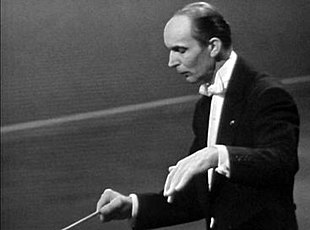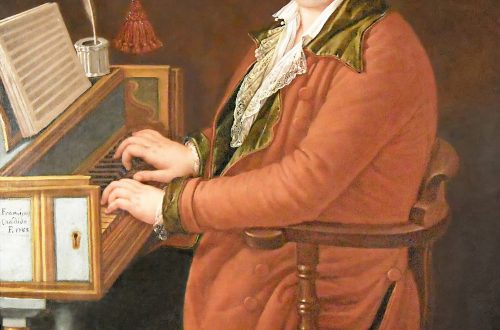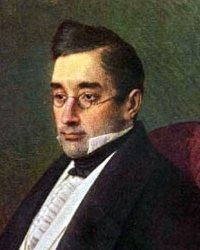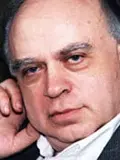
Igor Borisovich Markevich |
Igor Markevitch
French conductor and composer of Russian origin. “It is impossible to play better than the author wrote” – such is the motto of Igor Markevich, a conductor and teacher, with whom Soviet musicians and music lovers are well acquainted. This gave and continues to give some listeners a reason to reproach Markevich for his insufficiently pronounced individuality, for the lack of originality on the stage, for excessive objectivism. But on the other hand, much in his art reflects the characteristic trends in the development of the performing arts of our days. This was rightly noted by G. Neuhaus, who wrote: “It seems to me that he belongs to that type of modern conductor for whom the work and its performers, that is, the orchestra and orchestra members, are more important than himself, that he is primarily a servant of art, and not ruler, dictator. This behavior is very modern. The time when the titans of the conductor’s art of the past, from the point of view of enlightened academism (“one must first of all perform correctly”), sometimes allowed themselves liberties – they spontaneously subordinated the composer to their creative will – that time is gone … So, I rank Markevich among those performers who do not seek to flaunt themselves, but regard themselves approximately as “first among equals” in the orchestra. Spiritually embracing many individuals – and Markevich certainly knows this art – is always proof of great culture, talent and intelligence.
Many times during the 60s, the artist performed in the USSR, invariably convincing us of the versatility and universality of his art. “Markevich is an exceptionally versatile artist. We listened to more than one concert program performed by him, and yet it would be difficult to exhaustively determine the conductor’s creative sympathies. Indeed: what era, whose style is closest to the artist? Viennese classics or romantics, French impressionists or modern music? Answering these questions is not easy. He appeared before us as one of the best interpreters of Beethoven for many years, left an indelible impression with his interpretation of Brahms’ Fourth Symphony, full of passion and tragedy. And will his interpretation of Stravinsky’s The Rite of Spring be forgotten, where everything seemed to be filled with the life-giving juices of awakening nature, where the elemental power and frenzy of pagan ritual dances appeared in all their wild beauty? In a word, Markevich is that rare musician who approaches each score as if it were his own favorite composition, puts his whole soul, all his talent into it.” This is how the critic V. Timokhin outlined the image of Markevich.
Markevich was born in Kyiv into a Russian family closely associated with music for generations. His ancestors were friends of Glinka, and the great composer once worked at their estate on the second act of Ivan Susanin. Naturally, later, after the family moved to Paris in 1914, and from there to Switzerland, the future musician was brought up in the spirit of admiration for the culture of his homeland.
A few years later, his father died, and the family was in a difficult financial situation. The mother did not have the opportunity to give her son, who showed talent early, a musical education. But the remarkable pianist Alfred Cortot accidentally heard one of his early compositions and helped his mother send Igor to Paris, where he became his piano teacher. Markevich studied composition with Nadia Boulanger. Then he attracted the attention of Diaghilev, who commissioned him a number of works, including a piano concerto, performed in 1929.
Only in 1933, having taken several lessons from Herman Scherchen, did Markevich finally determine his calling as a conductor on his advice: before that, he had conducted only his own works. Since then, he has constantly performed with concerts and quickly moved into the ranks of the world’s largest conductors. During the war years, the artist left his favorite job to take part in the fight against fascism in the ranks of the French and Italian Resistance. In the post-war period, his creative activity reaches its peak. He leads the largest orchestras in England, Canada, Germany, Switzerland and especially France, where he works constantly.
Relatively recently, Markevich began his teaching career, conducting various courses and seminars for young conductors; in 1963 he directed a similar seminar in Moscow. In 1960, the French government awarded Markevich, then head of the Lamoureux Concerts orchestra, the title of “Commander of the Order of Arts and Letters”. He thus became the first non-French artist to receive this award; she, in turn, has become just one of the many awards that the tireless artist has been awarded.
L. Grigoriev, J. Platek, 1969





